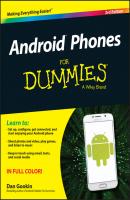Android Phones For Dummies. Dan Gookin
Чтение книги онлайн.

Читать онлайн книгу Android Phones For Dummies - Dan Gookin страница 2
Название: Android Phones For Dummies
Автор: Dan Gookin
Издательство: John Wiley & Sons Limited
Жанр: Зарубежная образовательная литература
Серия: For Dummies
isbn: 9781119126034
isbn:
Foolish Assumptions
Even though this book is written with the gentle handholding required by anyone who is just starting out or is easily intimidated, I have made a few assumptions.
I’m assuming that you’re still reading the introduction. That’s great. It’s much better than getting a snack right now or checking to ensure that the cat isn’t chewing through the TV cable again.
My biggest assumption: You have an Android phone. It can be any Android phone from any manufacturer supported by any popular cellular service provider in the United States. Because Android is an operating system, the methods of doing things on one Android phone are similar, if not identical, to doing things on another Android phone. Therefore, one book can pretty much cover the gamut of Android phones.
Android has versions. This book was updated to cover the current Android release, 5.1, known as Lollipop. Also addressed are KitKat and Jelly Bean, version numbers 4.3 and 4.4, respectively. These are all similar versions of the operating system, so if your phone has an older version, you should be just fine.
To confirm which Android version your phone has, follow these steps:
1. At the Home screen, touch the Apps icon.
2. Open the Settings app.
3. Choose the About Phone item.
On some Samsung phones, you need to first tap the General tab atop the screen and then swipe down the screen to find an About Device item. Samsung phones can be a little different from other Android phones, and those differences are highlighted throughout this tome.
4. Look at the item titled Android Version.
The version number is listed, such as 5.1.
Don’t fret if these steps confuse you: Review Part I of this book, and then come back here. (I’ll wait.)
More assumptions: You don’t need to own a computer to use your Android phone. If you have a computer, great. The Android phone works well with both PCs and Macs. When phone and computer cross paths, you’ll find directions for both PC and Mac.
Finally, this book assumes that you have a Google account. If you don’t, find out how to configure one in Chapter 2. Having a Google account opens up a slew of useful features, information, and programs that make using your phone more productive.
How This Book Is Organized
This book has been sliced into five parts, each of which describes a certain aspect of the typical Android phone or how it’s used.
Part I serves as an introduction to your Android phone. Chapters cover setup and orientation and familiarize you with how the phone works. This part is a good place to start – plus, you discover things in this part that aren’t obvious from just guessing how the phone works.
This part of the book is about communication. It starts with the obvious functions of making a phone call, dealing with voicemail, and using the phone’s address book. Also covered are communication tools, such as text messaging, email, using the web, and social networking opportunities.
Part III explores the non-phone things your phone can do. For example, your phone can find locations on a map, give you verbal driving directions, take pictures, shoot videos, play music, play games, and do all sorts of wonderful things that no one would ever think a phone can do. The chapters in this part of the book get you up to speed on those activities.
The chapters in Part IV discuss a slate of interesting topics, from connecting the phone to a computer, using Wi-Fi and Bluetooth networking, and taking the phone overseas and making international calls to adding security, working with apps, and personalizing your phone. Also addressed are the necessary chores of maintenance and troubleshooting.
Finally, this book ends with the traditional For Dummies Part of Tens, where every chapter lists ten items or topics. For your Android phone, the chapters include tips, tricks, shortcuts, and things to remember.
Icons Used in This Book
Where to Go from Here
Thank you for reading the introduction. Few people do, and it would save a lot of time and bother if they did. Consider yourself fortunate, although you probably knew that.
Your task now: Start reading the rest of the book – but not the whole thing, and especially not in order. Observe the table of contents and find something that interests you. Or look up your puzzle in the index. When these suggestions don’t cut it, just start reading Chapter 1.
My email address is [email protected]. Yes, that’s my real address. I reply to every email I receive, especially when you keep your question short and specific to this book. Although I enjoy saying “Hi,” I cannot answer technical support questions, resolve billing issues, or help you troubleshoot your phone. Thanks for understanding.
My website is www.wambooli.com. This book has its own page on that site, which you can check for updates, new information, and all sorts of fun stuff. Visit often:
www.wambooli.com/help/android/phones
Bonus information for this title can be found online. You can visit the publisher’s website to find an online Cheat Sheet at
www.dummies.com/cheatsheet/androidphones
Supplemental online material has been created СКАЧАТЬ